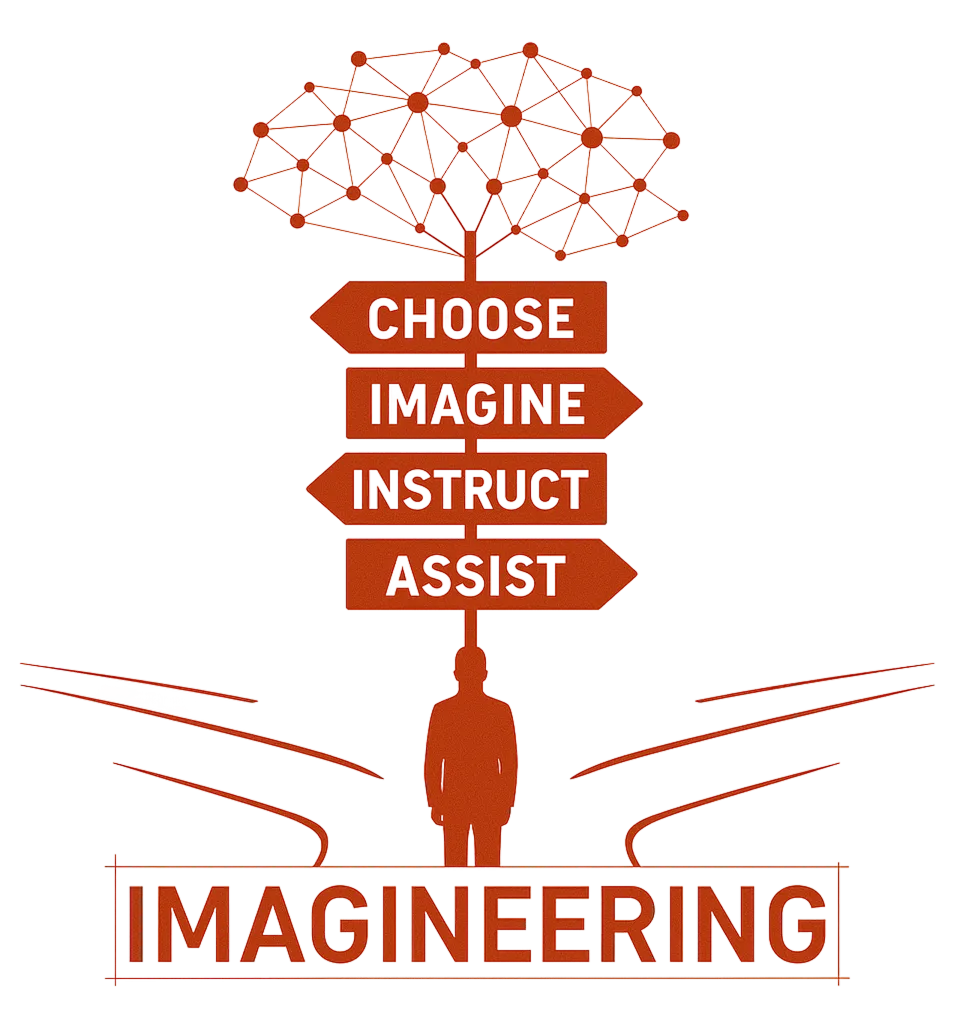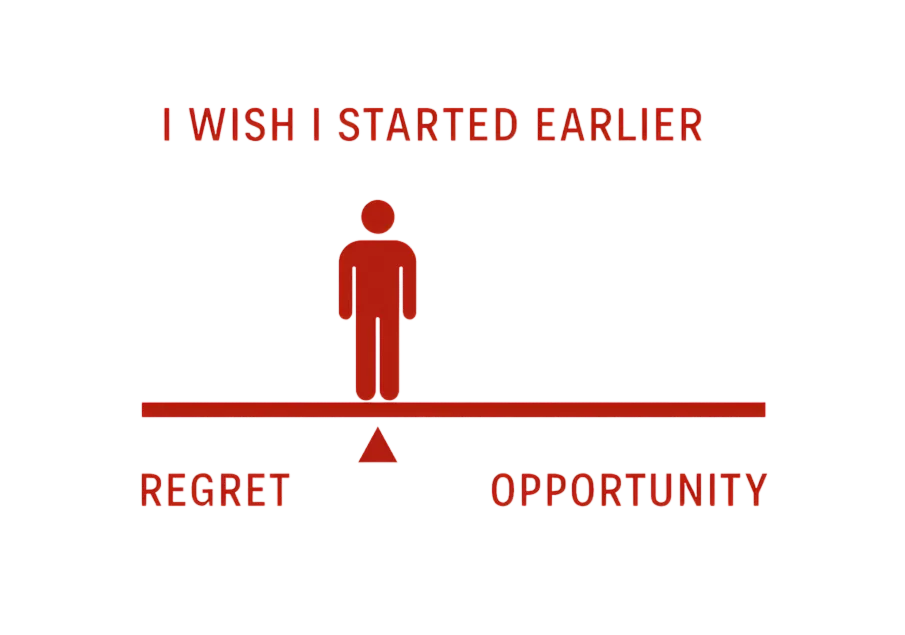It's Time for Imagineering
/ 9 min read

Introduction
The real pressure we face today from the accelerating rate of change is deciding what to do with it.
Recognizing that we might be experiencing a once-in-a-generation moment—our own “bicycle for the mind”—where those fortunate enough to hold a pen can rewrite so much of what’s previously defined, raises a crucial question: How can we minimize future regret?

Some view it through the lens of financial opportunity, while others focus on creative potential and transformative impact—but the underlying feeling remains the same: anxiety about missing out or being left behind.
In conversations with friends and colleagues, I get two types of reactions when talking about AI.
Some, particularly those deeply invested in their careers and confident in their specialized skills, still struggle to see tangible results or to extrapolate from initial signs. They often question my premise entirely, dismissing it as merely a passing incremental shift.
Others question the fundamental choices they’ve made in their careers—paralyzed by the decision of whether this is the right time to start something new rather than selling their time. Still others fear their roles as product managers, designers, or engineers might become obsolete.
In fact, it was a few conversations with younger engineers and product managers that prompted me to write this.
Spoiler: Unsurprisingly for those who know me, my take is extremely optimistic. If you’re self-aware enough to ask yourself these questions and resist the cynicism of either extreme, you’ll be fine.
What should I do?
I’m fortunate to be working at the cutting edge of AI & Web3 through my role leading a Venture Studio. Whenever AI comes up in conversations in social settings, I frequently encounter questions like these:
- “What should I focus on? Things are moving so fast."
- "Which skills will truly matter for my career?"
- "Will my role even exist in five years?”
My response typically goes like this: regardless of your current or future role, if it involves computers in any way, you will experience significant change—whether you seek it or not. However, the benefits won’t be distributed evenly; you’ll need to proactively pursue them. Now is a fantastic time to build a career in software development. While I can’t foresee exact future roles, I’m confident certain foundational skills will remain essential. Focus on developing those, and you’ll be fine.
I can see doubt in particular from junior engineers - seeing AI climbing coding benchmarks - it is just natural to ask yourself, should I even try to be proficient at <pick-a-language> or not? Many business gurus are saying no, but I think it would be a mistake.
There’s more depth to explore than any of the current compelling or extreme interpretations/narratives. The real “superpower” with AI comes only when you master how to expertly direct it within your workflow.
Yes, the most valuable skill might not be writing code (in fact that alone was almost never the core skill), but understanding exactly how to instruct an AI, why those instructions matter and to understand the result.
And no, despite what you might hear from those selling inference or GPUs, AGI isn’t here yet; significant gaps in today’s model capabilities still require careful management and human oversight.
Foundational skills such as critical thinking, creativity, domain-specific expertise, and clear communication are becoming even more critical. How are you going to build those skills if not by practicing them?
Experienced managers know that effectively guiding and evaluating others first requires a clear understanding of desired outcomes and how to achieve them. The most effective product and engineering managers I’ve met have learned through practical, often challenging, experiences—not just theoretical knowledge. The same principle applies when instructing AI.
In short, leave room for learning through experience, it will pay dividends.
The Imagineer
Inspired by Disney’s famed creative engine behind its theme parks, resorts, and attractions, I propose a curriculum of skills essential for a role I call “Imagineer.” Disney’s concept beautifully captures, in a nuanced way, the genuine long-term purpose of product engineering, design, and management roles. The idea of “Imagineering” particularly appeals to me as it moves us away from the increasingly popular but superficial trend of “vibe coding,” popularized by Andrej Karpathy, where developers abstract themselves entirely from the code, allowing AI agents to implement their vision autonomously.
While “vibe coding” highlights how far we’ve advanced in AI-assisted product development, it also reveals a more substantial and valuable shift: returning to the true essence of product-related roles—not merely to write code, shuffle tickets, or meet design schedules, but genuinely to solve problems, support and delight customers, and build successful businesses.
Skill 1: [Choose] Know what you want, and know why you want it
This is for my fellow product managers (or designers). Those in large companies often discount their skills as “Matrix Crawlers” or confuse the “P” for something else (i.e. “Project”, that always annoyed me). Others live with continuous impostor syndrome when dealing with their technical counterparts and think their job is shuffling tickets. (the “P” again)
Those who truly believe in the craft of product building, as I do, see a product manager as the person with the end-to-end vision of what a product could be—not just informed by instincts (though I have nothing against that), but through a complex series of signals.
For example:
-
They understand, from interviews, competitor analysis, usage data, and personal experience, not only what customers or prospects explicitly say today, but also anticipate what the market and customer base may genuinely desire in the future.
-
They understand the technical architecture of their product and can weigh real-time opportunity costs to determine the product’s realistic range of motion and prioritize accordingly.
-
Finally, they understand the business of software: making a marketable product, selling it, and building (or contributing to build) a great company around it.
Now, reading this, you might think I’m suggesting product managers will take over software development. That’s not what I am saying.
In fact, I cannot sincerely guarantee you that a distinct PM role will exist in the future of software companies. But I am confident, with or without AI, someone must possess these skills for a successful product and company.
I expect product roles to shift significantly with AI but skills in navigating ambiguity and driving product direction will always be needed (so long as humans sell to humans).
Skill 2: [Imagine] Capture in extreme detail what you want
It might sound obvious, but knowing precisely what we want and why we want it is essential to the creative process of developing marketable ideas.
Once you understand your options clearly from the previous step, we enter the deeply human skill of creativity, imagination, and invention.
This also feels threatened by AI, as my creative designer friends remind me.
But if you’ve followed so far, I’m not talking about designing an average landing page based on training data, or a simple CRUD SaaS. I’m talking about a different creative process—one so nuanced and poorly understood that we still refer to it as talent, not skill.
Note: This is where the real bottleneck lies in the era of extreme agency provided by AI.
In the AI stack, this often involves creating core “artifacts”—such as a BRD, PRD, prompt sequences, or wireframes—to effectively capture your vision as context and instructions. The goal is to use available tools to clearly and vividly communicate your mental image to a computer.
Today, my workflow involves dictating PRDs, knowing they’ll be consumed by AI for task decomposition. I think like an agent—focusing on context, reasoning, and dynamic information retrieval via tool access—to ensure downstream artifacts are AI friendly.
Having a clear vision of what you want and how you want it is the core for all of this process. Note that this is not prescriptive, there’s always going to be creative exploration during development, but decisions are guided by the vision you’re pursuing.
Finally, your “what and why” are informed by your “how.” Your domain knowledge significantly impacts your ability to imagine achievable goals. Don’t forget to learn along the way and use your experience. Remember, AI will always produce something—but quality depends on how well you understand what you’re bringing to life.
This principle applies universally.
Consider AI-generated art: someone versed in art history, style, color theory, and composition achieves vastly superior outcomes compared to someone lacking domain-specific fluency. Someone else might struggle to even find the words to describe what they want. The bar has lowered, but talent and experience is still rewarded.
Skill 3: [Build] Speak the Language of Machines—whatever that is when you read this
The defining skill of “imagineers” will be clearly instructing computers to help them build what they want. A lot of the debate today is at this level, is coding still a skill worth building?
History offers a lesson: technological leaps—assembly language to high-level languages, basic editors to intelligent IDEs, manual programming to AI-assisted coding—didn’t eliminate programming. Instead, they magnified skilled users’ impact.
The core skill is —and always has been— continuously learning novel ways to use a computer to do what you want (i.e. software or simplistically the “language of machines”).
As this space rapidly evolves, significant advantages can be gained simply by quickly internalizing how to use new models effectively, both to help you in your job or to do your job.
Ultimately it is about learning new ways to write software, and clearly communicating with machines remains the core skill we must not lose sight of.
It’s time for Imagineering
To sum up, don’t let AI hype overwhelm you. There’s no reason to panic, but it’s time for action. Return to the core reasons for doing your work, what genuinely drives you. Know that the procedural aspects of your job or titles might change along the way, but solving complex problems with taste and care remains deeply human.
This, to me, is “imagineering.” It’s not about short-term dopamine rushes from vibe coding but harnessing human creativity, ingenuity, and a new productivity paradigm.
It’s time for Imagineering.